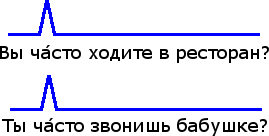Чай (часть третья)
The Russian word for tea is чай. It declines like this:
| Sg | Pl | |
| Nom | чай | чаи |
| Acc | ||
| Gen | чая | чаёв |
| Pre | чае | чаях |
| Dat | чаю | чаям |
| Ins | чаем | чаями |
You don't usually find the plural forms, but occasionally they are used to mean ‘types of tea.’ Mostly you just use the singular.
| Фу, чай уже остыл. | Yuck, the tea has already grown cold. |
| — С чем ты любишь чай? — Я люблю чай с лимоном. |
“What do you like with your tea?” “I like tea with lemon.” |
| — Ты любишь зелёный чай? — Мне всё равно, но мне больше нравится чёрный чай. |
“Do you like green tea?” “I have nothing against it, but I like black tea better.” |
| — Я очень интересуюсь чаем. — В смысле, ты любишь чай пить? — Да нет, у меня аллергия на чай. Я интересуюсь историей чая и тем, как чай стал таким популярным в России и Средней Азии. |
“I'm really interested in tea.” “You mean you like to drink tea?” “Oh, no, I’m allergic to tea. I'm interested in the history of tea and how it became so popular in Russia and Central Asia.” |
Tea always reminds me of a classic English joke. Supposedly between Lady Astor and Winston Churchill there was constant verbal sparring:
| ЛА: Винстон, если бы я была вашей женой, я бы подсыпала яд в ваш чай. ВЧ: Мадам, если бы Вы были моей женой, я бы сразу же его выпил. |
LA: Winston, if I were your wife, I would poison your tea. WC: Madam, if you were my wife, I would promptly drink it. |

Часто (часть вторая)
If you want to ask how often something happens in Russian, you can use the phrase «как часто»:
| Как часто вы ходите в ресторан? | How often do you go to restaurants? |
| Как часто ты звонишь бабушке? | How often do you call your grandmother? |
Now here's one of those subtle differences that occur between languages. Although the «как часто» phrase is perfectly grammatical in both Russian and English, the frequency of the use of the phrase is not the same. The English phrase is much more common in usage. In Russian it is more common to ask the question slightly differently, phrasing it simply "Do you often?":
| Вы часто ходите в ресторан? | Do you go to restaurants very often? |
| Ты часто звонишь бабушке? | Do you call your grandmother very often? |
When you ask the question, it is usually used with intonation construction three, jumping up on the stressed syllable of часто:

Часто (часть первая)
The adverb часто means frequently. Since it tells how often something happens, we can more specifically call it an adverb of frequency. It's often used much the same way as its English equivalent:
| Я часто спрашиваю себя, почему девушки так любят моего брата, а на меня вообще не обращают внимания. | I often ask myself why girls like my brother so much but don't pay any attention to me. |
| Мы часто водим собаку в парк гулять. | We often take the dog for walks in the park. |
| Раньше я довольно часто ходил в кино, но теперь я фильмы скачиваю на компьютер с Интернета. | I used to go to the movies pretty often, but nowadays I download films onto my computer from the Internet. |
| Нина слишком часто жалуется на своего парня. | Nina complains about her boyfriend too often. |
Часто is what we call the the "positive form" of the adverb; adverbs often have a "comparative form" as well, and in this case that form is чаще.
| Вера ходит в кино чаще, чем брат. | Vera goes to the movies more often than her brother. |
| Вера ходит в кино чаще брата. | |
| Я пью водку чаще, чем молоко. Молоко ведь бесполезно для мужчин. | I drink vodka more often than milk. After all, milk isn't healthy for men. |
Год (часть седьмая)
You may remember from yesterday that the case forms of год are:
| Sg | Pl | |
| Nom | год | годы, года |
| Acc | ||
| Gen | года, году | годов, лет |
| Pre | годе, году | годах |
| Dat | году | годам |
| Ins | годом | годами |
Today we need to discuss the genitive singular forms. The modern version of the genitive singular is года, but there is an older form that arose as a consequence of the u-stem genitives which nowadays only appears in stock phrases. So you will occasionally find phrases like:
| Phrase | Meaning |
| год от году | gradually, from year to year |
| без году неделя | hardly any time at all |
For instance:
| Год от году я прогрессирую довольно значительно. (adapted from this source) | I am making serious progress from year to year. |
| На бирже работаю — без году неделя. (adapted from this source) | I have been working at the stock exchange for hardly any time at all. |
There is a tendency in language to make the things that are irregular more regular. Thus the older plural ‘brethren’ in English has been mostly replaced by ‘brothers.’ Similarly nowadays it is much more common in Russian to say «год от года» than «год от году». It is still more common to find «без году неделя» than «без года неделя», but that ratio will most likely eventually change in favor of года.
Language changes. For instance, as I was growing up, I never heard anyone say “You want to come with?” for “Do you want to come with us?” I remember the first time I heard it. I thought “No native speaker of English could possibly ever say that!” I was wrong. All sorts of US native speakers say it nowadays, and nowadays it almost doesn't sound strange to me. This should teach us a lesson. No native speaker ever knows the entirety of his language. And if we find that Russian speakers occasionally give us contradictory language about their native language, this is also normal. In such situations, you need to ask multiple native speakers about your language issue, and then draw a rule of thumb from their responses.
Год (часть шестая)
The case forms of год are:
| Sg | Pl | |
| Nom | год | годы, года |
| Acc | ||
| Gen | года, году | годов, лет |
| Pre | годе, году | годах |
| Dat | году | годам |
| Ins | годом | годами |
Note the two nominative plural forms. Dictionaries list both, but truth to tell you almost never see the года version for the plural.
Note the two forms for the genitive plural. The form лет is used after numbers and а few other words like много, мало, сколько and несколько. Годов is used everywhere else:
| Я прожил несколько лет в Таганроге. | I spent a few years in Taganrog. |
| Американские машины тех годов считаются эталоном красоты и роскоши. (adapted from this source) | American cars of those years are considered the gold standard of beauty and luxury. |
Note the two forms of the prepositional case. The form in -у is used to say "in such and such a year", and the -е form is used as the prepositional case form in other contexts:
| В том году мы жили в Баку. | That year we lived in Baku. |
| Мы говорили о годе дракона. | We talked about the year of the dragon. |
We will address the alternative genitive forms tomorrow.
<< 1 ... 15 16 17 ...18 ...19 20 21 ...22 ...23 24 25 ... 158 >>